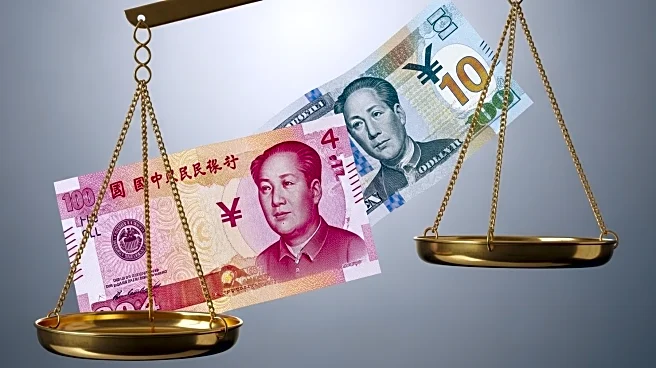What is the story about?
What's Happening?
The Chinese yuan has recently shown a mixed performance in the global currency market. It has appreciated by about 3% against the U.S. dollar this year, driven by Beijing's economic policies and a weakening dollar. This appreciation is attributed to factors such as the U.S. economic slowdown, rising debt, and foreign policy uncertainties. However, the yuan has depreciated against other major currencies like the euro, British pound, and Japanese yen, which has made Chinese exports more competitive in these markets. This divergence in the yuan's performance is largely due to the U.S. dollar's significant decline, which is on track for its worst year in over two decades. Economists predict that the yuan could strengthen further against the dollar by the end of the year, supported by Beijing's efforts to boost economic growth and investment.
Why It's Important?
The yuan's dual performance has significant implications for global trade and economic relations. Its appreciation against the dollar could enhance the attractiveness of Chinese assets, potentially leading to increased foreign investment in China. Conversely, the depreciation against other currencies may exacerbate trade tensions, as it makes Chinese goods more competitive in non-U.S. markets. This shift in competitiveness could lead to trade imbalances, drawing criticism from major trading partners. The situation also places the People's Bank of China in a challenging position, as it must balance domestic economic growth with international trade relations. The yuan's performance could influence global economic dynamics, particularly in regions heavily reliant on trade with China.
What's Next?
Looking ahead, the People's Bank of China may face pressure to adjust its monetary policies in response to the yuan's performance. While there is speculation about potential interest rate cuts, the central bank must consider the risk of inflating a stock market bubble. Additionally, ongoing trade negotiations with the U.S. and other countries could impact the yuan's trajectory. The Chinese government may need to navigate these complexities carefully to maintain economic stability and foster positive international relations. The yuan's future movements will likely be closely monitored by global investors and policymakers.
Beyond the Headlines
The yuan's performance highlights broader economic strategies and geopolitical considerations. China's approach to currency management reflects its efforts to balance domestic economic priorities with international trade dynamics. The yuan's appreciation against the dollar could be seen as a strategic move to align with global economic shifts, while its depreciation against other currencies may be viewed as a tactical advantage in trade negotiations. These developments underscore the interconnectedness of global economies and the intricate balance required in international economic policy.















